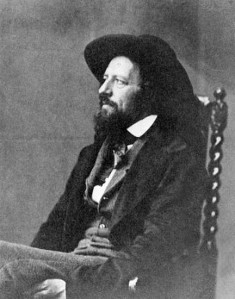Tennyson Loses Poland November 12, 2010
Author: Beach Combing | in : Modern , trackback In the encylopedia of burning libraries Alfred Tennyson’s lost long poem Poland is a minor entry, but it is still one that deserves to be written and perhaps even to be read about. It also brings together three of Beachcombing’s favourite themes: Poland and Tennyson – obviously – but also the incomparable William Allingham whose diary is the most interesting of all Victorian attempts at introspection.
In the encylopedia of burning libraries Alfred Tennyson’s lost long poem Poland is a minor entry, but it is still one that deserves to be written and perhaps even to be read about. It also brings together three of Beachcombing’s favourite themes: Poland and Tennyson – obviously – but also the incomparable William Allingham whose diary is the most interesting of all Victorian attempts at introspection.
WA takes up the pen remembering a conversation with AT.
Looking at the chimney-piece, Tennyson said ‘When I began to read Italian, I wrote down every word that puzzled me on the sides and front of the chimney-piece where I lodged – painted white – and made a kind of dictionary for myself. I went away for two or three days and when I came back it was all washed off. ‘Thought it was dirt,’ the woman said.
Here Beachcombing must point out a topos in burning-libraries literature, the bumbling proletariat incinerating Shakespeare folios or waking Coleridge from Xanadu.
‘Oh the unwashed, ignorant fools’, we are supposed to shout, ‘let’s increase our taxes and educate them’.
In this case, the charcoal dictionary (if it can be called that) has not prevented future generations from learning Dante’s argot. But at least it set Tennyson off thinking of other losses.
‘Worse than that – when I was 22 I wrote a beautiful poem on Poland, hundreds of lines long, and the housemaid lit the fire with it. I never could recover it’.
Another blameworthy yokel from the lower classes: how they do make poets’ blood pressure rise… Though Tennyson was a far nicer man than some of the poetic wretches Beachcombing recently dissected on his table – the bearded one likely mumbled a bit and then smoked a pipe.
Then what about its length? ‘Hundreds of lines…’ Beachcombing is a Tennyson fan but to be honest he prefers the shorter works: Rosalind, To Virgil, Crossing the Bar and In Memoriam (read in bits) rather than the longer narratives. Is there then a cowardly part of the Beachcomber’s heart that is actually glad that Poland did not survive? Beachcombing fears that this may, indeed, be the case. After finishing this post he’ll go for a walk and examine his conscience.
And what was Poland about? Well, luckily one sonnet by Tennyson (written in his late teens or aged 20/21) gives us some idea of the tone and position that Tennyson would have taken. Its title is, you’ve guessed it: Poland though Beachcombing prefers to think of it as Shorter Poland.
How long, O God, shall men be ridden down,
And trampled under by the last and least
Of men? The heart of Poland hath not ceased
To quiver, tho’ her sacred blood doth drown
The fields; and out of every smouldering town
Cries to Thee, lest brute Power be increased,
Till that o’ergrown Barbarian in the East
Transgress his ample bound to some new crown:
Cries to thee, ‘Lord, how long shall these things be?
How long this icyhearted Muscovite
Oppress the region?’ Us, O Just and Good,
Forgive, who smiled when she was torn in three;
Us, who stand now, when we should aid the right –
A matter to be wept with tears of blood!
Shorter Poland appeared in 1830 in Poems Chiefly Lyrical. Poland (the country) had ceased to exist in 1795 when it was carved up by Prussia, Austria and Russia – hence Tennyson’s Russian bating. Shorter Poland comes after another sonnet, Buonaparte that puts the Corsican upstart in place ‘we taught him’ etc. Together they give us a glimpse of Tennyson aged 21: half British jingo, half Romantic democrat.
Is it possible that Tennyson was inspired for his Longer Poland by the Cadet’s Revolution in November 1830, after the publication of Poems Chiefly Lyrical, when the Poles rose in one of their heroic, neverending, inspired tantrums for nationhood? The chronology would fit – he was 22.
In any case, Beachcombing wonders if the maid who got rid of Longer Poland didn’t do the young Tennyson a favour. Tennyson’s Poems Chiefly Lyrical were not a huge critical success: a seven-hundred line epic trying to find English words to rhyme with Wysocki might have finished Tennyson off for good among Victorian England’s intelligensia.
Tennyson is the bizzarists poet par excellence but Beachcombing has been disappointed how few bizarre stories he has yet found about AT – please correct the deficit! drbeachcombing AT yahoo DOT com
Boże, coś Polskę!


